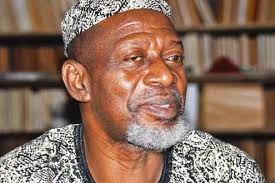Nigeria still has heroes and effective civil service, say Mabogunje, Ofeimun
Against the backdrop of collapsing leadership and national values which have made corruption and its allegations rampant in high places, two foremost Nigerians, poet and gubernatorial aspirant in Edo State, Odia Ofeimun and Professor Emeritus, Akin Mabogunje, have said that Nigeria still has heroes who can compare with those of other lands.
In the same vein, the Nigerian Civil Service, they said, has prospect which would make it to go places.
They made this known in separate forewords to two new books written and just released by former Permanent Secretary in the Ministry of Communications, Dr. Tunji Olaopa.
The books entitled Labour of our heroes past and Civil Service and the Imperative of Nation Building were published by Bookcraft Publishers in Ibadan.
According to Ofeimun, coming on the heels of an earlier work entitled A Prophet is with Honour – The Life and times of Ojetunji Aboyade, a biography of former Vice Chancellor of the University of Ife, now Obafemi Awolowo University, economic adviser to successive Federal Governments in the 70’s and into the 90s written by the same author, Labour of our heroes past holds prospects for the exploration of heroes long forgotten.
“It (the book) is a painstaking exposition of the travails of managing change in a society quite desperately in need of prime movers. The desperation, as a virtual fabric of the whole society, is clearly the reason that the author is ready to grant the outstanding performers in our midst, the feat-makers, so to say, the status of culture heroes. Otherwise, truly evident and uplifting, across Olaopa’s many books, is that he has turned his own admiration and worship of our heroes past into a means of personal, communal and national pursuit of organizational effectiveness,” said Ofeimun.
According to Ofeimun, the book is a new insight into the theory of charismatic leadership as a political theory.
“This book, quintessentially, is braced for a reversal of the verdict; and to bring grand visibility and acceptance to those whom the author considers deserving of acknowledgement as heroes. By memorializing their feats, up-raising the heroic status of people like Claude Ake himself, and deploying the values and standards that he and others have upheld in sector after sector, a corrective is emplaced against the rudderless, morally anarchic devaluation of outstanding performers,” Ofeimun said.
On the heroes so labelled in the book, Ofeimun said it is “a commingling of legendary entrepreneurs like Dantata, da Rocha, Ojukwu the elder, Dangote, Omolayole and an Onosode with maverick social consciences and educationist like atheistic Tai Solarin and lawyer-activist, human rights crusader Gani Fawehinmi, Pentecostal pastors like Enoch Adejare Adeboye, and Oyedepo, all in the same feast of herohood with Bishop Hassan Mathew Kukah, a catholic priest pursuing an ecumenical programme of dialogue between diverse creeds, on the same counterpane with Wande Abimbola, a virtual Babalawo, who is toasted for removing the libel and rudeness of the bad sciences that once consigned traditional religion, and specifically Yoruba Ifa divination system, to a zone of fetish, if not barbarism. By the same token, we are enabled to deepen acquaintance with great minds like Professor B.J. Dudley, one of Africa’s most rigorous political scientists; and Professor Ayodele Awojobi, a professor of mechanical engineering with specialization in vibrations, an inventor, social critic and futuristic thinker; and the savvy economist, Pius Okigbo; the mathematician, politician and folk hero, Chike Obi; and scholar and gender activist, Bolanle Awe, writers and artists Wole Soyinka and Chinua Achebe, D. O. Fagunwa, Hubert Ogunde and the much younger Chimamanda Adichie – all of whose achievements may be consensually upheld as building blocks for the ultimate national edifice.
“Among physicians, Adeoye Lambo, Oritshejolomi Thomas, Umaru Shehu and Oladipo Akinkugbe are duly celebrated as are the great denizens of the Ibadan School of History for incomparable practice and research. The consequence is that the country is presented or delivered not as a place of discordance or anarchy but a site of vibrant, earthy conversations, absorbing diverse forms of creativity and worldviews within a shared knowledge industry. Squarely, by canvassing a common sense of values across disciplines, careers and vocations, the perfectly correct verdict bodies out: that this is not a land without heroes. A recourse to heroes of other lands, Nelson Mandela, Julius Nyerere, and the scholar, intellectual, Ali Mazrui is made virtually as a form of authentication of values and extension of rationale for this book .”
In his own foreword on the book Civil Service and the Imperative of Nation Building, Mabogunje, first African president of the International Geographical Union and first African to be elected as a Foreign Associate of the United States’ National Academy of Sciences, who traced the chequered history of the Nigerian civil service, said the book “has taken on the challenge of delving into the workings of the Nigerian Civil Service to dissect the basis of its dysfunction, failings, successes, progress and future possibilities from both a theoretical and practical perspectives. His passion for research and the intellectual confidence with which he presents his findings, observations and conclusions are attributes not commonly found among career civil servants. Indeed, the structure of most of the essays in the volume is certainly a critical notch above the conventional public commentaries that populate our nation’s newspapers, with most of the analysis duly spiced with personal anecdotes and wisdom quotes from great minds in the political and administration arena.”


